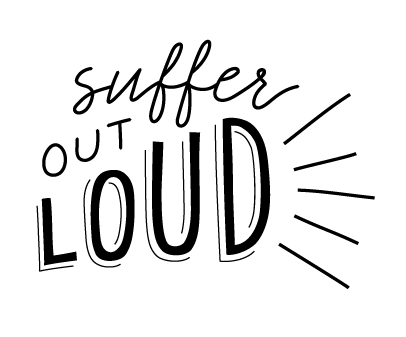Fighting for Myself
By Amelia
*Triggering content, please read with care
Being on the other side of an emotionally tumultuous young adulthood, I still find so much value in sharing my story as a way to connect with my younger self. As a pre-teen, the first signs of something being wrong began to stir up at the same time my dad went to Afghanistan. He’s not a veteran, but he was in combat zones working daily in volatile conditions. You can imagine the stress that put on my mother, alone with three teenagers. We were told that these contracts would ensure we could afford to go to college - it was a sacrifice he was making for us. So I suffered quietly. I didn’t really think I had the right to call it suffering - nothing bad had ever happened to me. Regardless, the feelings were there and they were scary.
Thinking I couldn’t talk to anyone, I turned to the internet to seek out others going through similar emotional tidal waves. Unfortunately, the teen mental health community was an echo chamber of our worst thoughts and impulses. We were all twelve and scared out of our wits by what our brains were doing; having others around to talk us through it felt better than nothing.
It wasn’t until my freshman year of high school that my mom found my self-harm stash. She asked me what had happened to make me act like this;
I had no answer.
I told my mother, through tears, that I just wanted help. My mom responded that my dad (who was in Afghanistan again) would divorce her if he knew she had let me do this to myself; therapy wasn’t an option. So, after I was ungrounded, I set up an email account in my mother’s name and booked a therapy appointment myself. The day of, I told my mother I was staying after school to work out. I ran from the school to the office and paid in cash from my savings from working summers. I had no idea what to expect from therapy; I thought it might help, and as a bonus, it was a rebellion against my mom. I briefly gave the therapist a rundown of what had been going on, leaving out the recent blow up. She told me it was normal to be going through these things and steered the conversation towards grades and school friendships. I never went back.
The last three years of high school were marred by disordered eating, self harm, two suicide attempts, and deep shame. This is a lot to write and I’m sure it’s a lot to read;
take a breath.
We’re still here.
At the time, I felt that I didn’t have any reason to be feeling these things, or to be so violently self destructive, but there was no one I could talk to. What if my friends responded the way my mother had? What if the school counselors shrugged it off too? It took until my sophomore year of college for me to gather up the courage to see a college-provided counselor. She was one of the best things that ever happened to me - she helped me set down the guilt and explained that trauma can be passed down. That my parents’ horrific childhoods did not give them a “get out of jail free” card for bad parenting. That through their choice to not address their traumas, I had suffered; I didn’t have to call it abuse, or emotional neglect, or any of the words that felt like blame. I could, however, accept that two things could be true at once: my parents had suffered, and they had caused me suffering.
I was able to start medication and everything seemed like it was on a brighter trajectory. Then over Christmas break my junior year, the school psychiatrist refilled a prescription and sent it to my home pharmacy, which called my parents to let them know the order was ready. All hell broke loose. I had been “deceiving” my parents by not telling them I was on medication that “I didn’t need.” My dad gave me the silent treatment for the next three weeks. My mom told me in private that therapy was fine, my older brother had been in it for years, but that medication was not necessary.
That sunk deep.
All these years I had been fighting on my own, thinking the worst of myself for asking for help, and my brother had been in therapy - paid for by my parents - for who knew how long. All of this his sent me into a spiral, at the end of which was my third attempt. I had a therapist this time, and when I told her I’d overdosed, we had a serious discussion about whether or not I needed treatment. I probably did, but for many reasons, I said no.
Two years later, I am on the other side of highs and lows. I survived one more attempt, and I graduated college with honors, surpassing what my teenage self wouldn’t have thought possible. After a move across the country, I am now in Montana, a beautiful place to start over with new and different struggles, I am working to keep my head above water and to find a professional support system here. With my personal concoction of mental illness, suicidal ideation is something that never really goes away, but I am finally building a life for myself, a life filled with friends and joy and new adventures, and I am determined to stick it through. Organizations like Suffer Out Loud make it much less isolating for Montanans (and aspiring Montanans like myself) to find support. I’m grateful to be here and I hope anyone who has similarly been let down by the very people meant to support you feels less alone reading this.
We are in this together.
